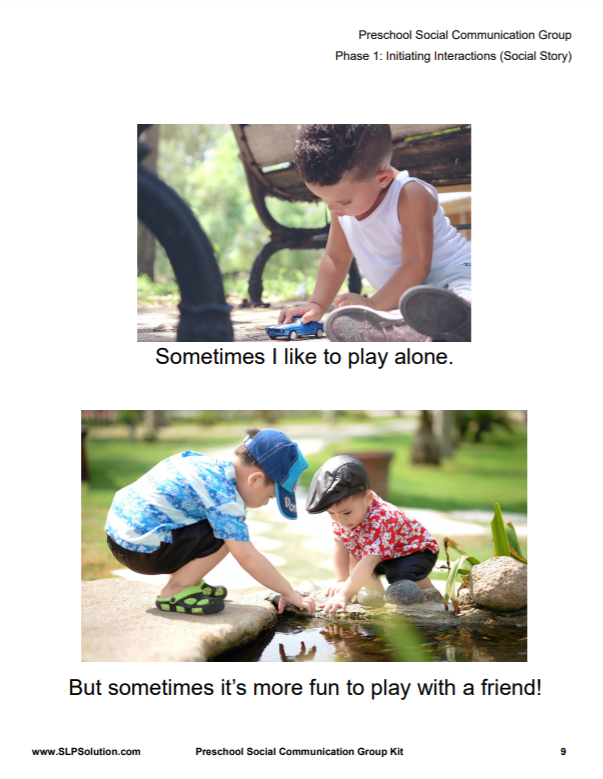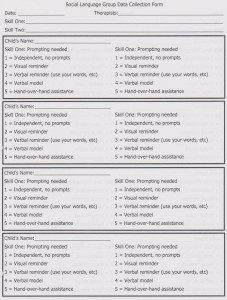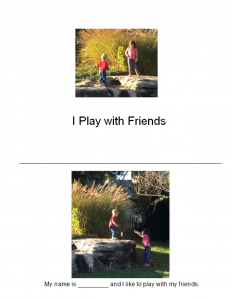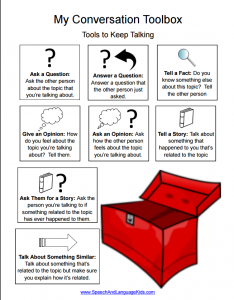Social Skills Activities for Preschoolers
Many children with social language impairments have difficulty initiating or starting an interaction. Some children aren’t at all motivated to interact with others and therefore need a little bit of encouragement from us to get the ball rolling. Other children are very interested in interacting with others but just don’t know how. They may act out to get attention or just hide themselves away instead of putting themselves out there. Here are some steps to help you figure out how to motivate children to initiate and maintain interactions and how to do it appropriately.
How to Teach Social Skills to Preschoolers:
- Does your preschooler have trouble getting along with others?
- Does your preschooler have trouble making friends?
- Do you wish you had some social skill activities to do with your preschooler?
You need some SOCIAL SKILL ACTIVITIES to do with your child! Keep reading!!
This post will give you some great ideas about social skill activities that you can do with your preschooler to help him/her learn how to initiate and maintain interactions with other children. These activities come straight from a preschool social skills therapy group that I have used in my own practice as a speech-language pathologist!
Social Skill Activities: Greetings and Introductions
- Teach the skill: Tell your child that when he meets someone new, he should say “Hi, I’m ____ (his name). What’s your name?” You could teach this skill by making a page on your computer with pictures of children saying “hi” and then writing in a speech bubble above them that says what he is expected to say. If your child is not speaking in full sentences yet, you could modify this to have your child just say “hi” or “I’m ___”.
- Practice the skill: Have your child practice saying this to everyone that is available. He could practice saying it to Dad, Grandma, siblings, the babysitter, anyone that is around.
- Use the skill in real life: Take your child somewhere that he will meet other children that do not know him well. This could be the play-place at McDonalds, a park, a church or school event, etc. On the way there, remind your child that he will need to say his rehearsed phrase when he meets a new child. You can practice it in the car on the way there. Once you get there, follow your child around and remind him or prompt him on what to say if he forgets. Then, hang back and let him play for a while. But remind him about what to say if a new child arrives or joins the play. If other parents comment on your interjections, just explain that you’re working on your child’s ability to interact through social skill activities. They will either leave it or that or they may want to know more!
Social Skill Activities: Asking for a Turn
- Teach the skill: Tell your child that if she wants something that someone else has, she needs to ask for a turn. She can do this by saying “my turn” or “May I have a turn” (choose whichever one is appropriate for your child’s language level).
- Practice the skill: Take turns with your child asking for turns with a toy. Make sure your child knows that when you say “my turn”, she needs to give you a turn. You can also practice waiting a few minutes between giving someone for a turn and asking for it back. You can practice this with other familiar people as well.
- Use the skill in real life: Once again, take your child somewhere that she will be playing with other children. Remind your child that she will need to ask politely for turns when she gets there. Stay close by while your child plays so that you can remind her to ask for a turn and give turns when others ask as needed.
Social Skill Activities: Responding to Other Kids
- Teach the skill: Tell your child that when another child says something or asks a question, he needs to respond. You can give him some examples of what other children might say. You can tell your child that if another kid says “Do you want to play with me?”, he should say yes. If the other child says “I like your shirt!”, your child can say “Thank you”.
- Practice the skill: During play with your child, ask your child a variety of questions and make suggestions as well. Make sure that your child responds appropriately each time. If not, tell your child “Hang on, I said something to you. What could you say back?” If possible, bring in other play partners, like familiar adults and other kids and tell them to talk to your child as well.
- Use the skill in real life: When your child is out in the community playing with other kids, give him gentle reminders when you see him not respond to peer interactions or questions. You can say “Billy asked you if you want to play, what could you say?”
Social Skill Activities: Maintaining Interactions
- Teach the skill: It is important that your child knows how to maintain an interaction as well as start one. Give your child some ideas of things she could say during play that would keep the interaction going. For example, your child could ask the other child a question (“What are you doing with that?”), make a comment (“whoa that’s cool!”), offer a toy (“Would you like one of these?”), or make a play idea suggestion (“Let’s build a tower!”). You could even draw simple pictures of these things and have them on a sheet of paper as a reminder.
- Practice the skill: During play with your child, remind your child every once in a while to be talking to you (or any other play partner). You can get out the pictures you drew when teaching the skill and ask your child to pick one strategy to use. You could also just offer them a few choices. For example, you might say “Andy, don’t forget to be talking while you play. Are you going to ask me a question or make a comment?”
- Use the skill in real life: When your child is playing with other kids, give your child an idea of something he could say if he starts to ignore the other child. You could say “Why don’t you ask Jenny what she’s doing with that block?” or “Why don’t you see if Bobby would like a car”.
The key to learning social interactions for any child is practice, practice, practice. Social skill activities such as these are a great way to do just that. Have patience with your child and provide them many opportunities to practice a new skill. The more you model appropriate play skills and show your child what to do, the easier it will become. Share these social skill activities with other adults in your child’s life (such as teachers, therapists, caregivers) so they can help support your child as well. For more great tips and resources, “like” us on Facebook or twitter and receive content and ideas not available anywhere else!

About the Author: Carrie Clark, MA CCC-SLP
Hi, I’m Carrie! I’m a speech-language pathologist from Columbia, Missouri, USA. I’ve worked with children and teenagers of all ages in schools, preschools, and even my own private practice. I love digging through the research on speech and language topics and breaking it down into step-by-step plans for my followers.
Connect with Me:







[…] ** Click here for more social skills activities for preschoolers. […]
My daughter is going to be in preschool this fall, and I’m a little worried. She gets really anxious in social settings, especially when she is around other kids. She does okay taking turns, but she could use some help being able to introduce herself. I really like what you said about practicing the skill at home, and then in real life, having her introduce herself. I like your suggested about going to the park, that would be the perfect place to practice!
Excellent! That can be so hard for anxious children. I hope it helps!
Many classes overlook the importance of building strong social skills. I really like your ideas with this, it inspired me to incorporate some of these activities into my own class.
My daughter will turn 4 next month. She is going to preschool. She talk only when she wants to ,not much into social interaction.some times she even say I don’t like to talk when prompt.she even say I don’t wanna play alone.pls help
very positive and informative article. it will help students to learn social activities during their school life. keep doing work like 9 Social skills Activities Your Students Shouldn’t Miss in future.
When should you see kids responding to other kids bids for conversation? I.e do you want to play with me? Or a teacher saying goodbye, etc.
At three years of age we like to see children noticing other children and joining them to play. And they should be able to talk in a conversation using at least 2 back and forth exchanges. That would be about the point I would start looking for those responding skills. Though it’s important to remember that all children will be distracted or engrossed in things from time to time and not remember to respond.